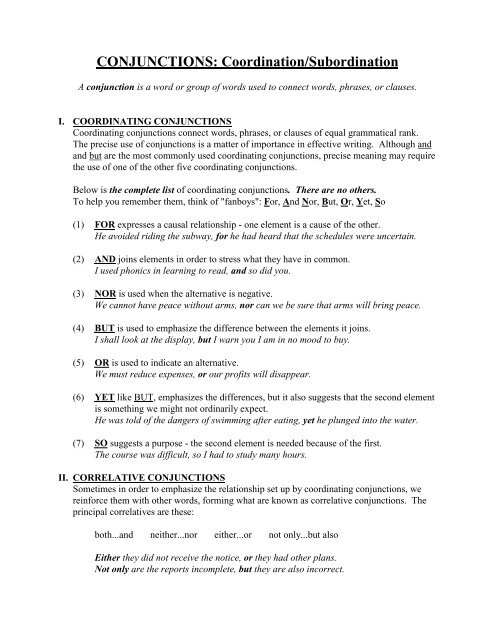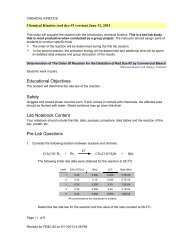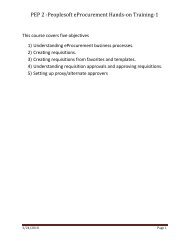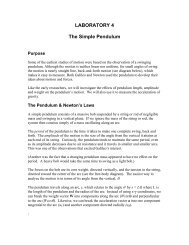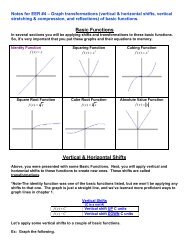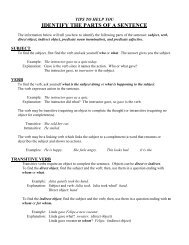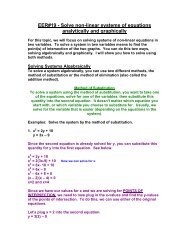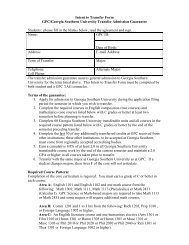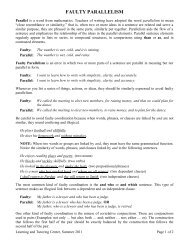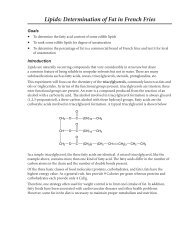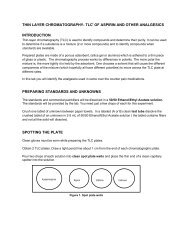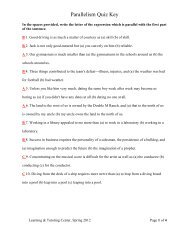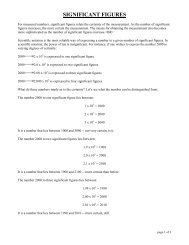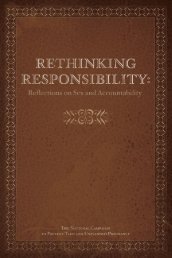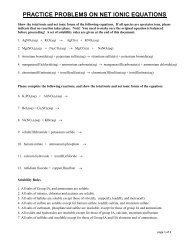CONJUNCTIONS: Coordination/Subordination
CONJUNCTIONS: Coordination/Subordination
CONJUNCTIONS: Coordination/Subordination
You also want an ePaper? Increase the reach of your titles
YUMPU automatically turns print PDFs into web optimized ePapers that Google loves.
<strong>CONJUNCTIONS</strong>: <strong>Coordination</strong>/<strong>Subordination</strong><br />
A conjunction is a word or group of words used to connect words, phrases, or clauses.<br />
I. COORDINATING <strong>CONJUNCTIONS</strong><br />
Coordinating conjunctions connect words, phrases, or clauses of equal grammatical rank.<br />
The precise use of conjunctions is a matter of importance in effective writing. Although and<br />
and but are the most commonly used coordinating conjunctions, precise meaning may require<br />
the use of one of the other five coordinating conjunctions.<br />
Below is the complete list of coordinating conjunctions. There are no others.<br />
To help you remember them, think of "fanboys": For, And Nor, But, Or, Yet, So<br />
(1) FOR expresses a causal relationship - one element is a cause of the other.<br />
He avoided riding the subway, for he had heard that the schedules were uncertain.<br />
(2) AND joins elements in order to stress what they have in common.<br />
I used phonics in learning to read, and so did you.<br />
(3) NOR is used when the alternative is negative.<br />
We cannot have peace without arms, nor can we be sure that arms will bring peace.<br />
(4) BUT is used to emphasize the difference between the elements it joins.<br />
I shall look at the display, but I warn you I am in no mood to buy.<br />
(5) OR is used to indicate an alternative.<br />
We must reduce expenses, or our profits will disappear.<br />
(6) YET like BUT, emphasizes the differences, but it also suggests that the second element<br />
is something we might not ordinarily expect.<br />
He was told of the dangers of swimming after eating, yet he plunged into the water.<br />
(7) SO suggests a purpose - the second element is needed because of the first.<br />
The course was difficult, so I had to study many hours.<br />
II. CORRELATIVE <strong>CONJUNCTIONS</strong><br />
Sometimes in order to emphasize the relationship set up by coordinating conjunctions, we<br />
reinforce them with other words, forming what are known as correlative conjunctions. The<br />
principal correlatives are these:<br />
both...and neither...nor either...or not only...but also<br />
Either they did not receive the notice, or they had other plans.<br />
Not only are the reports incomplete, but they are also incorrect.
The elements joined by correlatives must be alike in structure, or the force of the correlatives will<br />
be lost.<br />
Incorrect: They are not only tired, but they are disgusted.<br />
(Adjective joined with independent clause.)<br />
Correct: They are not only tired but disgusted.<br />
Correct: Not only are they tired, but they are also disgusted.<br />
(independent clause with independent cause.)<br />
III. SUBORDINATING <strong>CONJUNCTIONS</strong><br />
Subordinating conjunctions connect clauses that are of subordinate importance to the<br />
independent clause or to some element in the main clause. The following are some of the<br />
more common ones:<br />
because, in that, since . . . . . . . . . . . . . indicates cause<br />
although, except, though, while . . . . . . . indicates concession<br />
if, whether . . . . . . . . . . . . . . . . . . . . . . indicates condition<br />
as, as if, as though . . . . . . . . . . . . . . . . . indicates manner<br />
whence, where, wherever . . . . . . . . . . . . indicates place or direction<br />
in order that, so, so that, that . . . . . . . . . indicates purpose<br />
after, as long as, as soon as,<br />
before, since, when . . . . . . . . . . . . . indicates time<br />
Words equivalent to phrases, such as wherein (in which), whereby (by which), wherewith (with<br />
which), and wherefore (for which) are all subordinating conjunctions.<br />
IV. CONJUNCTIVE ADVERBS<br />
Such words are also, besides, further, however, nevertheless, so thus, hence, thence, and<br />
therefore are frequently used as conjunctive adverbs. Since they function as devices for<br />
logical transition between sentences and even between paragraphs, they differ from ordinary<br />
grammatical connectives. A period or semicolon must be used with the conjunctive adverb<br />
to avoid a comma splice.<br />
I am not at all satisfied with his report of the accident; therefore, I am going to ask him to<br />
rewrite it.<br />
The streets were so slippery that all public transportation was halted. Hence, all classes<br />
were cancelled.


